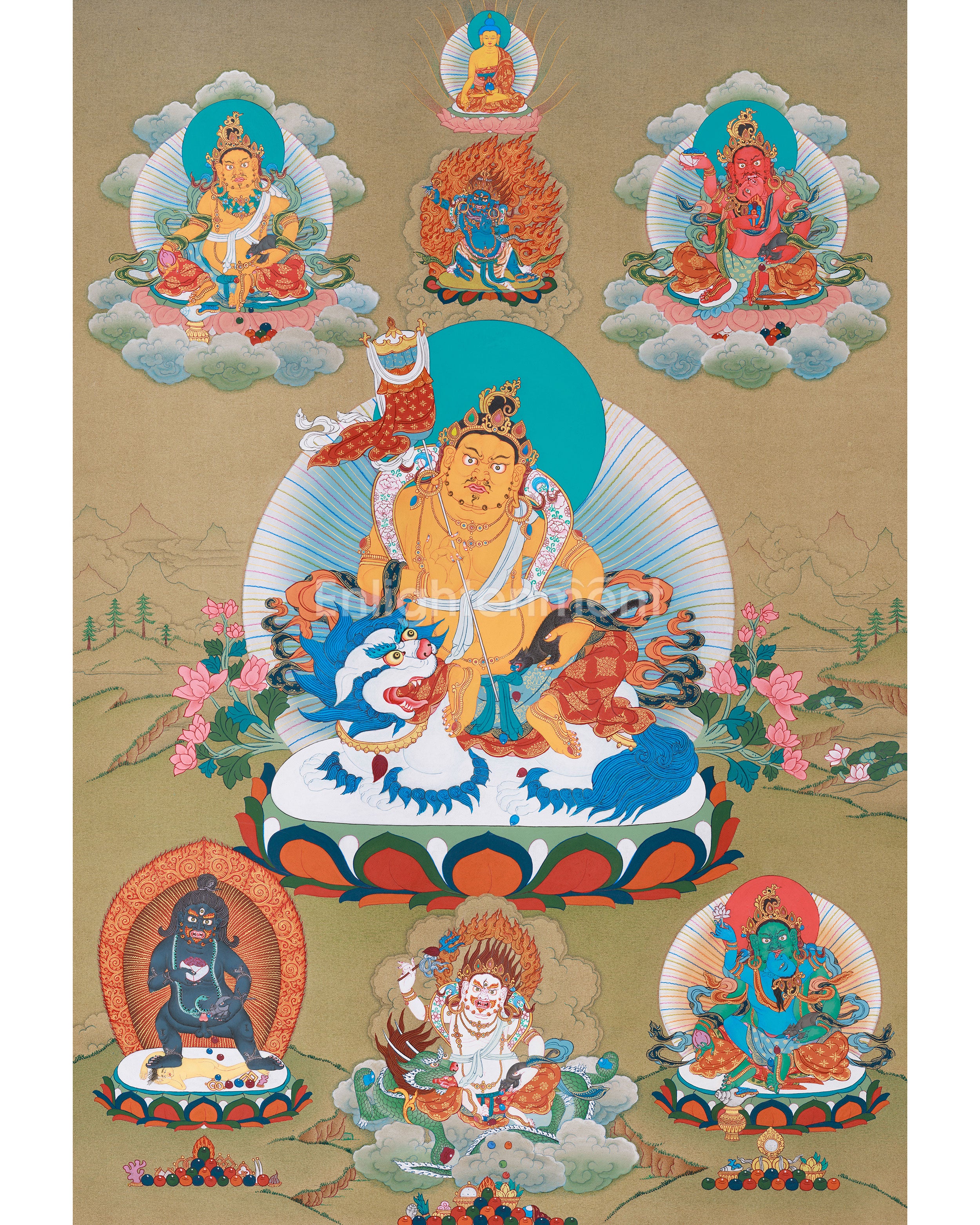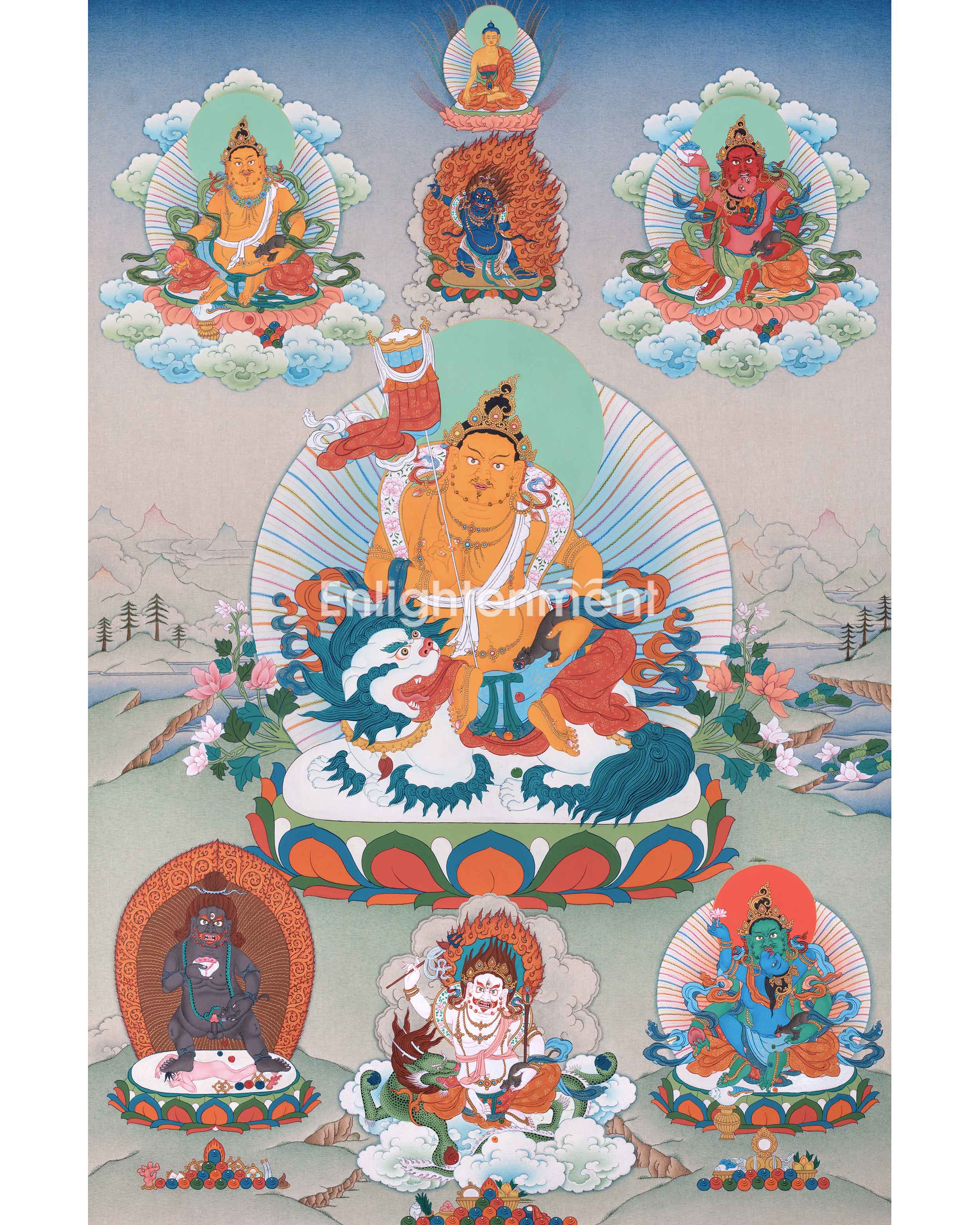Wealth Deity
2 products
Showing 1 - 2 of 2 products
Wealth Deities in Buddhism: Bestowing Prosperity and Spiritual Richness
Background and Significance
In Vajrayana Buddhism, wealth deities are not merely symbols of material prosperity, but embodiments of inner richness—generosity, merit, abundance, and spiritual fulfillment. Depicted in vibrant, meaningful iconography, our collection of wealth deity thangkas offers practitioners powerful supports for daily offerings, visualization, and accumulation practices. These thangkas serve as potent reminders of the inseparability of worldly well-being and inner spiritual growth.
Explore our wide range of traditional and refined thangkas, including Karma Gadri, Gold-on-Black, and Natural Stone Pigment styles, hand-painted with precision on authentic cotton canvas. Our Collection of Wealth deities including
Dzambhala (Jambala / Zambala) Thangka:
Dzambhala is the most widely revered wealth deity in Tibetan Buddhism. Regarded as an emanation of Avalokiteshvara and Vajrapani, he removes poverty and cultivates generosity. There are five primary forms of Dzambhala, each with unique colors and attributes:
-
Yellow Dzambhala: Increases wealth and merit.
-
White Dzambhala: Offers purification of poverty and emotional afflictions.
-
Black Dzambhala: Protects against spiritual and material obstacles.
-
Green Dzambhala: Associated with Karma activities and speed in granting blessings.
-
Red Dzambhala: Grants power and control over wealth and resources.
We offer both individual and Five Dzambhala Set Thangkas in premium painting styles.
Namtoshe (Vaishravana) Thangka:
Vaishravana, also known as Namtoshe, is the King of the Yakshas and a guardian of the north. Often seated on a snow lion holding a victory banner or a citron fruit, he represents royal wealth, protection, and spiritual authority. His practice is widely embraced by both lay practitioners and monastics seeking prosperity and success in Dharma activities.
White Mahakala (Gonpo Karpo)Thangka
White Mahakala is a benevolent aspect of the wrathful protector Mahakala. While Black Mahakala clears obstacles, White Mahakala ensures the continuity of resources needed for the Dharma path. With his compassionate yet fierce expression, he stabilizes material wealth and supports the sustenance of practitioners.
Vasudhara (Nor-gyunma) Thangka
Vasudhara is the goddess of abundance, revered especially in Nepalese Buddhism. She is golden, radiating generosity, often depicted with six arms holding symbols of prosperity such as the treasure vase, grain, and the wish-fulfilling gem. She is a perfect embodiment of spiritual and material generosity, especially suited for householders.
Why Practice Wealth Deities in Buddhism?
In Vajrayana, wealth is not shunned—it is transformed. These deities help eliminate poverty, remove karmic obstacles, and support practitioners in maintaining the necessities to live ethically and practice consistently. Regular practice:
-
Enhances generosity (dana paramita)
-
Increases material and spiritual wealth
-
Clears karmic hindrances related to lack and scarcity
-
Supports the sustenance of monasteries, Dharma teachers, and retreats
Whether for practice, altar display, or spiritual gift, our thangkas are created to inspire and elevate your spiritual exercises.


